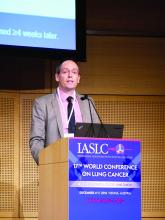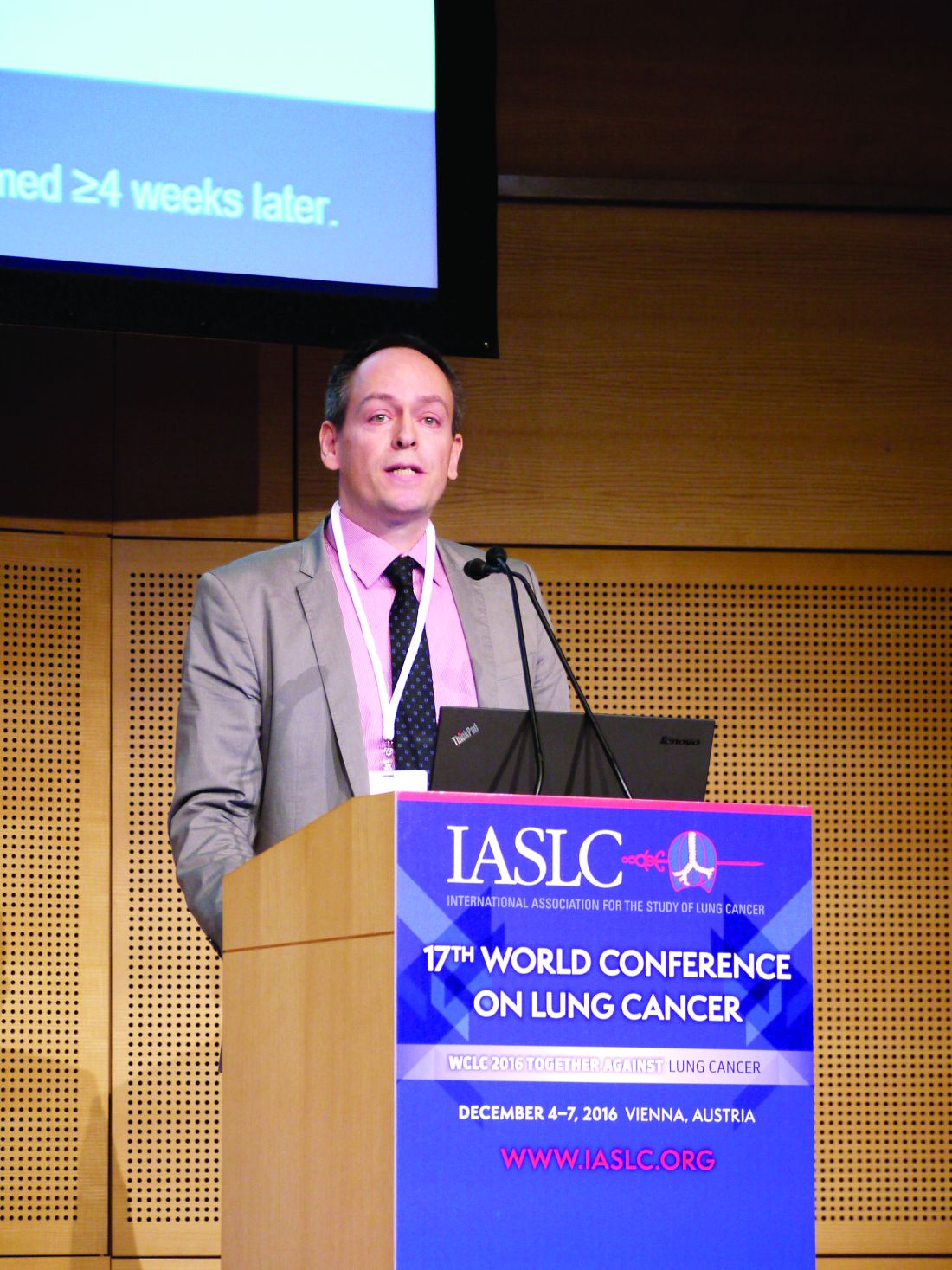User login
VIENNA – One third of patients with extensive-stage small-cell lung cancer (SCLC) treated with the checkpoint inhibitor pembrolizumab achieved an objective response, according to updated data from the KEYNOTE-28 trial.
Of the 24 patients with advanced SCLC who received pembrolizumab in the multicohort phase Ib study, one had a complete response, seven had a partial response, and one further patient had stable disease for 6 or more months, giving a clinical benefit rate of 33.3% (95% CI, 15.6-53.3%).
“Pembrolizumab demonstrated meaningful antitumor activity in previously treated patients with PD-L1-positive small-cell lung cancer,” said presenting study author Patrick A. Ott, MD, PhD, of the Dana-Faber Cancer Institute in Boston.
“Responses were durable, with a median duration of response of 19.4 months,” Dr. Ott said at the World Conference on Cancer, which is sponsored by the International Association for the Study of Lung Cancer. About 40% of patients exhibited a decrease in tumor size, he added.
Treatment with pembrolizumab was associated with a progression-free survival (PFS) of 1.2 months, with a range of 1.7-5.9 months. The 6- and 12-month PFS rates were 28.6% and 23.8%, respectively.
The median overall survival (OS) was 9.7 months, ranging from 4.1 months to an upper limit that has not yet been reached. The respective 6- and 12-month OS rates were 66.0% and 37.7%.
“The safety experience was consistent with previous experience for pembrolizumab in other tumor types, and was identical with longer follow-up” Dr. Ott said.
Over a median follow-up duration of 9.8 months, treatment-related adverse events occurred in two-thirds of patients, with arthralgia, asthenia, and rash reported by four (16.7%) patients each, and diarrhea and fatigue by three (12.5%) patients each. There were no cases of pneumonitis.
The mean age of patients recruited into the KEYNOTE-28 trial was 60.5 years; more than half of the patients (58%) were male. Five (20.8%) had stable brain metastases, and 95.8% had small cell histology.
All recruited patients had received prior standard-of-care chemotherapy with cisplatin or carboplatin plus etoposide, 45.8% had received irinotecan or topotecan, and 29.2% had been treated with a taxane. In addition, one patient had received prior radiotherapy, one had been given an investigational tyrosine kinase inhibitor therapy, and another had received another, unspecified, investigational treatment.
After enrollment, all patients were treated with pembrolizumab at an intravenous dose of 10 mg/kg every 2 weeks. Response was assessed every 8 weeks for the first 6 months and then annually, with patients continuing to respond continuing to be treated for up to 2 years or until progression or unacceptable toxicity.
There are two ongoing, phase II trials with pembrolizumab in patients with advanced SCLC. One is looking at maintenance therapy with pembrolizumab after combination chemotherapy and is sponsored by the Barbara Ann Karmanos Cancer Institute in collaboration with the National Cancer Institute (NCT02359019). The other, the REACTION trial sponsored by the European Organisation for Research and Treatment of Cancer, is looking at the use of pembrolizumab together with etoposide and platinum chemotherapy in previously untreated patients (NCT02580994).
Merck funded the KEYNOTE-28 study. Dr. Ott disclosed ties with Bristol-Myers Squibb, Merck, ArmoBiosciences, AstraZeneca/MedImmune, Celldex, Genentech, Alexion, and CytomX.
VIENNA – One third of patients with extensive-stage small-cell lung cancer (SCLC) treated with the checkpoint inhibitor pembrolizumab achieved an objective response, according to updated data from the KEYNOTE-28 trial.
Of the 24 patients with advanced SCLC who received pembrolizumab in the multicohort phase Ib study, one had a complete response, seven had a partial response, and one further patient had stable disease for 6 or more months, giving a clinical benefit rate of 33.3% (95% CI, 15.6-53.3%).
“Pembrolizumab demonstrated meaningful antitumor activity in previously treated patients with PD-L1-positive small-cell lung cancer,” said presenting study author Patrick A. Ott, MD, PhD, of the Dana-Faber Cancer Institute in Boston.
“Responses were durable, with a median duration of response of 19.4 months,” Dr. Ott said at the World Conference on Cancer, which is sponsored by the International Association for the Study of Lung Cancer. About 40% of patients exhibited a decrease in tumor size, he added.
Treatment with pembrolizumab was associated with a progression-free survival (PFS) of 1.2 months, with a range of 1.7-5.9 months. The 6- and 12-month PFS rates were 28.6% and 23.8%, respectively.
The median overall survival (OS) was 9.7 months, ranging from 4.1 months to an upper limit that has not yet been reached. The respective 6- and 12-month OS rates were 66.0% and 37.7%.
“The safety experience was consistent with previous experience for pembrolizumab in other tumor types, and was identical with longer follow-up” Dr. Ott said.
Over a median follow-up duration of 9.8 months, treatment-related adverse events occurred in two-thirds of patients, with arthralgia, asthenia, and rash reported by four (16.7%) patients each, and diarrhea and fatigue by three (12.5%) patients each. There were no cases of pneumonitis.
The mean age of patients recruited into the KEYNOTE-28 trial was 60.5 years; more than half of the patients (58%) were male. Five (20.8%) had stable brain metastases, and 95.8% had small cell histology.
All recruited patients had received prior standard-of-care chemotherapy with cisplatin or carboplatin plus etoposide, 45.8% had received irinotecan or topotecan, and 29.2% had been treated with a taxane. In addition, one patient had received prior radiotherapy, one had been given an investigational tyrosine kinase inhibitor therapy, and another had received another, unspecified, investigational treatment.
After enrollment, all patients were treated with pembrolizumab at an intravenous dose of 10 mg/kg every 2 weeks. Response was assessed every 8 weeks for the first 6 months and then annually, with patients continuing to respond continuing to be treated for up to 2 years or until progression or unacceptable toxicity.
There are two ongoing, phase II trials with pembrolizumab in patients with advanced SCLC. One is looking at maintenance therapy with pembrolizumab after combination chemotherapy and is sponsored by the Barbara Ann Karmanos Cancer Institute in collaboration with the National Cancer Institute (NCT02359019). The other, the REACTION trial sponsored by the European Organisation for Research and Treatment of Cancer, is looking at the use of pembrolizumab together with etoposide and platinum chemotherapy in previously untreated patients (NCT02580994).
Merck funded the KEYNOTE-28 study. Dr. Ott disclosed ties with Bristol-Myers Squibb, Merck, ArmoBiosciences, AstraZeneca/MedImmune, Celldex, Genentech, Alexion, and CytomX.
VIENNA – One third of patients with extensive-stage small-cell lung cancer (SCLC) treated with the checkpoint inhibitor pembrolizumab achieved an objective response, according to updated data from the KEYNOTE-28 trial.
Of the 24 patients with advanced SCLC who received pembrolizumab in the multicohort phase Ib study, one had a complete response, seven had a partial response, and one further patient had stable disease for 6 or more months, giving a clinical benefit rate of 33.3% (95% CI, 15.6-53.3%).
“Pembrolizumab demonstrated meaningful antitumor activity in previously treated patients with PD-L1-positive small-cell lung cancer,” said presenting study author Patrick A. Ott, MD, PhD, of the Dana-Faber Cancer Institute in Boston.
“Responses were durable, with a median duration of response of 19.4 months,” Dr. Ott said at the World Conference on Cancer, which is sponsored by the International Association for the Study of Lung Cancer. About 40% of patients exhibited a decrease in tumor size, he added.
Treatment with pembrolizumab was associated with a progression-free survival (PFS) of 1.2 months, with a range of 1.7-5.9 months. The 6- and 12-month PFS rates were 28.6% and 23.8%, respectively.
The median overall survival (OS) was 9.7 months, ranging from 4.1 months to an upper limit that has not yet been reached. The respective 6- and 12-month OS rates were 66.0% and 37.7%.
“The safety experience was consistent with previous experience for pembrolizumab in other tumor types, and was identical with longer follow-up” Dr. Ott said.
Over a median follow-up duration of 9.8 months, treatment-related adverse events occurred in two-thirds of patients, with arthralgia, asthenia, and rash reported by four (16.7%) patients each, and diarrhea and fatigue by three (12.5%) patients each. There were no cases of pneumonitis.
The mean age of patients recruited into the KEYNOTE-28 trial was 60.5 years; more than half of the patients (58%) were male. Five (20.8%) had stable brain metastases, and 95.8% had small cell histology.
All recruited patients had received prior standard-of-care chemotherapy with cisplatin or carboplatin plus etoposide, 45.8% had received irinotecan or topotecan, and 29.2% had been treated with a taxane. In addition, one patient had received prior radiotherapy, one had been given an investigational tyrosine kinase inhibitor therapy, and another had received another, unspecified, investigational treatment.
After enrollment, all patients were treated with pembrolizumab at an intravenous dose of 10 mg/kg every 2 weeks. Response was assessed every 8 weeks for the first 6 months and then annually, with patients continuing to respond continuing to be treated for up to 2 years or until progression or unacceptable toxicity.
There are two ongoing, phase II trials with pembrolizumab in patients with advanced SCLC. One is looking at maintenance therapy with pembrolizumab after combination chemotherapy and is sponsored by the Barbara Ann Karmanos Cancer Institute in collaboration with the National Cancer Institute (NCT02359019). The other, the REACTION trial sponsored by the European Organisation for Research and Treatment of Cancer, is looking at the use of pembrolizumab together with etoposide and platinum chemotherapy in previously untreated patients (NCT02580994).
Merck funded the KEYNOTE-28 study. Dr. Ott disclosed ties with Bristol-Myers Squibb, Merck, ArmoBiosciences, AstraZeneca/MedImmune, Celldex, Genentech, Alexion, and CytomX.
AT WCLC 2016
Key clinical point: Pembrolizumab has antitumor activity in patients with advanced small-cell lung cancer.
Major finding: The objective response rate was 33.3% (95% CI 15.6-55.3%), including one complete and seven partial responses.
Data source: Phase Ib, nonrandomized, multicohort trial of 24 heavily pretreated patients with extensive-disease small-cell lung cancer.
Disclosures: Merck funded the study. Dr. Ott disclosed ties with Bristol-Myers Squibb, Merck, ArmoBiosciences, AstraZeneca/MedImmune, Celldex, Genentech, Alexion, and CytomX.

